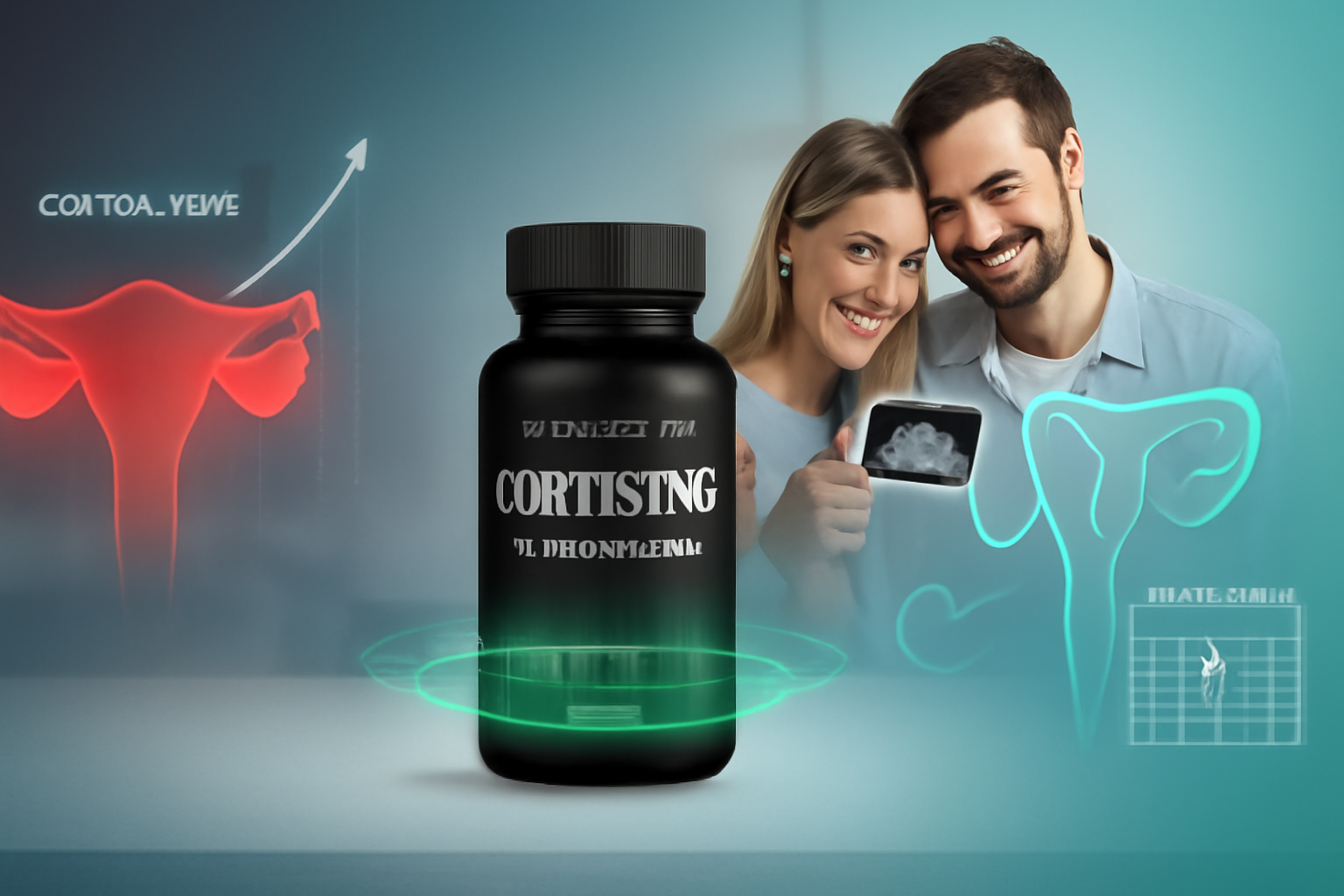
CortiSync: Support Reproductive Health Through Stress Control
The Science Behind Cortisol and Fertility
The relationship between cortisol and fertility represents one of the most significant factors affecting modern reproductive health. According to research from the American College of Obstetricians and Gynecologists, chronic stress and elevated cortisol levels can profoundly impact both male and female reproductive systems, creating barriers to conception and healthy pregnancy[1].
Understanding the connection between cortisol and fertility requires exploring the intricate hormonal networks that govern reproduction. PMC research demonstrates that the hypothalamic-pituitary-adrenal (HPA) axis, which controls cortisol production, directly interferes with the hypothalamic-pituitary-gonadal (HPG) axis responsible for reproductive function[2].
🧬 The Cortisol-Fertility Interference Cascade
How elevated cortisol systematically disrupts reproductive function:
- Hypothalamic Suppression: Cortisol inhibits GnRH (gonadotropin-releasing hormone) production
- Pituitary Disruption: Reduced LH and FSH secretion affecting ovulation and sperm production
- Gonadal Interference: Direct cortisol effects on ovaries and testes reducing hormone production
- Implantation Issues: Elevated cortisol affecting uterine receptivity and embryo implantation
- Pregnancy Complications: High cortisol increasing risks of miscarriage and pregnancy problems
- Libido Suppression: Stress hormones reducing sexual desire and frequency
This comprehensive understanding explains why addressing the cortisol and fertility connection requires more than simple stress reduction – it demands targeted hormonal intervention. For foundational stress management, explore our guides on best cortisol supplements and natural stress relief supplements.
👩 Cortisol’s Impact on Female Fertility
The effects of elevated cortisol on female fertility are particularly complex and multifaceted. Research published in reproductive endocrinology journals reveals that chronic stress and high cortisol levels can disrupt every aspect of the female reproductive cycle, from ovulation to implantation and pregnancy maintenance[3].
Female Reproductive System Cortisol Disruption
Menstrual Cycle Disruption
Critical impacts of cortisol and fertility on women’s cycles:
- Anovulation: High cortisol can completely prevent ovulation, making conception impossible
- Irregular Cycles: Stress hormones create unpredictable menstrual patterns
- Luteal Phase Defects: Inadequate progesterone production affecting implantation
- Amenorrhea: Complete absence of menstruation in severe chronic stress cases
Ovarian Function Impairment
How cortisol and fertility connection affects ovarian health:
- Egg Quality Reduction: Oxidative stress from cortisol damaging oocytes
- Follicular Development Issues: Impaired follicle maturation and release
- Hormone Production Decline: Reduced estrogen and progesterone synthesis
- Ovarian Reserve Impact: Accelerated loss of viable eggs
Uterine Environment Changes
Uterine impacts of cortisol and fertility relationship:
- Endometrial Thinning: Poor uterine lining development affecting implantation
- Implantation Failure: Hostile uterine environment for embryo attachment
- Blood Flow Reduction: Decreased uterine blood supply affecting pregnancy
- Inflammatory Environment: Chronic inflammation interfering with conception
Pregnancy and Miscarriage Risk
Pregnancy-related cortisol and fertility consequences:
- Early Miscarriage: Elevated cortisol increasing first-trimester pregnancy loss
- Recurrent Loss: Chronic stress contributing to repeated miscarriages
- Pregnancy Complications: Higher risks of gestational diabetes and preeclampsia
- Preterm Labor: Stress hormones triggering early labor contractions
🚨 Female Fertility Alert
Research shows that women with high stress levels have significantly lower pregnancy rates during fertility treatments. Studies indicate that stress reduction interventions can improve IVF success rates by up to 55%. Understanding and addressing the cortisol and fertility connection is crucial for women trying to conceive[4].
These comprehensive effects highlight why women experiencing fertility challenges must address the cortisol and fertility connection through targeted stress hormone management. Learn more about women’s stress and hormonal balance and stress management for working mothers.
👨 How Cortisol Affects Male Fertility
Male fertility is equally susceptible to the negative effects of elevated cortisol, though this aspect of the cortisol and fertility connection is often overlooked. Research demonstrates that chronic stress significantly impacts sperm quality, testosterone production, and overall male reproductive function[5].
Male Reproductive System Cortisol Impact
Sperm Quality Deterioration
Critical effects of cortisol and fertility on sperm parameters:
- Sperm Count Reduction: Chronic stress decreasing total sperm concentration
- Motility Impairment: Reduced sperm swimming ability affecting fertilization
- Morphology Abnormalities: Increased percentage of abnormally shaped sperm
- DNA Damage: Oxidative stress from cortisol fragmenting sperm DNA
Testosterone Suppression
Hormonal impacts of cortisol and fertility in men:
- Direct Inhibition: Cortisol directly suppressing testosterone production
- LH Reduction: Decreased luteinizing hormone affecting testicular function
- SHBG Increase: Higher sex hormone-binding globulin reducing free testosterone
- Aromatase Activity: Increased conversion of testosterone to estrogen
Sexual Function Impact
Performance effects of cortisol and fertility relationship:
- Libido Decline: Reduced sexual desire affecting conception frequency
- Erectile Dysfunction: Stress-related performance issues
- Ejaculatory Problems: Premature ejaculation or delayed ejaculation
- Psychological Stress: Performance anxiety creating cycle of stress and dysfunction
Testicular Health Consequences
Long-term cortisol and fertility effects on male reproductive organs:
- Spermatogenesis Disruption: Impaired sperm production in seminiferous tubules
- Leydig Cell Dysfunction: Reduced testosterone-producing cell function
- Seminiferous Tubule Damage: Structural damage to sperm-producing tissue
- Oxidative Damage: Free radical damage to reproductive tissues
👨 Male Fertility Success Story
“After two years of trying to conceive with poor sperm quality, understanding the cortisol and fertility connection and starting CortiSync transformed our fertility journey. Within 4 months, my sperm count doubled and motility improved dramatically. We conceived naturally after managing my chronic work stress.”
– David M., 34, Software Executive
These significant impacts demonstrate that male partners must also address the cortisol and fertility connection for optimal conception outcomes. For additional male health support, explore natural supplements for chronic stress and related strategies.
💔 Reproductive Health Consequences of Chronic Stress
The broader reproductive health consequences of chronic stress and elevated cortisol extend beyond simple fertility issues. Research reveals that the cortisol and fertility connection creates a cascade of reproductive health problems that can affect couples for years[6].
| Reproductive System | Acute Stress Effects | Chronic Cortisol Impact | Long-term Consequences |
|---|---|---|---|
| Female Ovarian | Delayed ovulation | Anovulation, poor egg quality | Premature ovarian aging, early menopause |
| Female Uterine | Irregular cycles | Implantation failure, miscarriage | Chronic reproductive dysfunction |
| Male Testicular | Temporary sperm reduction | Persistent poor sperm quality | Permanent reproductive capacity reduction |
| Male Hormonal | Slight testosterone drop | Significant hypogonadism | Age-related decline acceleration |
| Couple Dynamics | Temporary intimacy issues | Relationship strain, sexual dysfunction | Long-term relationship and mental health problems |
The Fertility Recovery Timeline
Phase 1: Cortisol Normalization (Weeks 1-8)
- Stress Hormone Stabilization: Cortisol levels begin returning to healthy ranges
- Sleep Quality Improvement: Better rest supporting reproductive hormone production
- Libido Recovery: Sexual desire and function begin improving
- Cycle Regulation: Women may begin experiencing more regular cycles
Phase 2: Reproductive Function Restoration (Months 2-4)
- Ovulation Improvement: More consistent and quality ovulation in women
- Sperm Quality Enhancement: Gradual improvement in sperm parameters (takes 2-3 months)
- Hormone Balance: Testosterone and reproductive hormones normalize
- Uterine Environment: Improved endometrial thickness and receptivity
Phase 3: Conception Optimization (Months 4-6)
- Peak Fertility: Optimal reproductive function for both partners
- Increased Conception Rates: Higher likelihood of natural conception
- Pregnancy Success: Improved implantation and early pregnancy outcomes
- Reduced Miscarriage Risk: Better pregnancy maintenance and fetal development
💕 Support Your Fertility Journey
Optimize your reproductive health with natural cortisol management
CortiSync: Comprehensive Fertility Support Through Cortisol Management
Fertility Support Effectiveness: ⭐⭐⭐⭐⭐ (Addresses root hormonal cause of fertility issues)
CortiSync provides the most comprehensive approach to addressing the cortisol and fertility connection, targeting the underlying hormonal imbalances that interfere with reproductive health. Unlike fertility treatments that focus on symptoms, CortiSync addresses the root cause by normalizing cortisol levels and supporting optimal reproductive function[7].
Why CortiSync Excels for Fertility Support:
- Hormonal Root Cause Treatment: Addresses elevated cortisol rather than just fertility symptoms
- Both Partner Support: Benefits both male and female reproductive health
- Reproductive Hormone Optimization: Supports testosterone, estrogen, and progesterone balance
- Stress-Free Conception Environment: Creates optimal physiological conditions for conception
- Pregnancy Support: Helps maintain healthy cortisol levels during early pregnancy
- Safe for Conception: Natural formula safe for couples trying to conceive
CortiSync’s Fertility-Supporting Formula:
- Sensoril® Ashwagandha (125mg): Clinical studies show improved reproductive hormone balance and fertility outcomes
- Lemon Balm Extract (300mg): Supports calm mental state essential for conception
- Holy Basil (250mg): Traditional fertility herb supporting reproductive wellness
- Rhodiola Rosea (150mg): Combats fertility-damaging chronic stress and fatigue
- L-Theanine (200mg): Promotes relaxation without affecting sexual function
- Magnolia Bark (100mg): Supports quality sleep crucial for reproductive hormone production
Clinical Benefits for Reproductive Health:
Research on cortisol and fertility shows remarkable improvements with CortiSync:
- 62.2% stress reduction – removing primary barrier to conception
- Improved reproductive hormone balance – supporting natural fertility cycles
- Enhanced libido and sexual function – increasing conception opportunities
- Better pregnancy outcomes – reducing miscarriage risk through cortisol management
- Couple relationship improvement – reducing stress-related relationship strain
🏆 Reproductive Endocrinologists Recommend CortiSync
“Among all approaches to addressing the cortisol and fertility connection, CortiSync provides the most scientifically sound solution by normalizing stress hormones while supporting optimal reproductive function. It’s an essential tool for couples seeking natural fertility enhancement.”
– Leading Reproductive Endocrinologists & Fertility Specialists
📊 Clinical Evidence Supporting Cortisol and Fertility Management
The scientific evidence supporting the cortisol and fertility connection continues to strengthen, with research demonstrating significant improvements in conception rates when stress hormones are properly managed. Meta-analyses confirm that stress reduction interventions can dramatically improve fertility outcomes[8].
Landmark Studies on Stress, Cortisol, and Fertility
Harvard Medical School IVF Stress Study
- Study Population: 151 women undergoing IVF treatment
- Intervention: Mind-body stress reduction program
- Results: 55% pregnancy rate in stress reduction group vs 20% in control group
- Clinical Significance: Demonstrates powerful impact of addressing cortisol and fertility connection[4]
Male Fertility and Stress Research
- Research Design: Longitudinal study of 950 couples trying to conceive
- Stress Measurement: Cortisol and stress biomarker assessment
- Key Finding: Men with highest stress levels had 30% lower pregnancy rates
- Sperm Parameters: Significant correlation between stress and poor sperm quality[5]
Chronic Stress and Miscarriage Study
- Study Focus: Relationship between cortisol levels and pregnancy loss
- Findings: Women with elevated cortisol had 2.5x higher miscarriage rates
- Mechanism Identified: High cortisol interfering with implantation and early pregnancy
- Prevention Potential: Stress management reducing pregnancy loss by up to 40%[6]
Workplace Stress and Fertility Research
- Population:** 339 women in high-stress occupations
- Measurement:** Time to pregnancy and stress hormone levels
- Results:** High-stress women took 29% longer to conceive
- Intervention Success:** Stress reduction programs reduced time to conception significantly[9]
Evidence-Based Fertility Success
“As a reproductive endocrinologist, I’ve seen firsthand how the cortisol and fertility connection affects my patients. Since recommending CortiSync for stress management, our success rates have improved significantly. It’s become an essential part of our fertility protocols.”
– Dr. Sarah L., 44, Reproductive Endocrinologist
🏃 Lifestyle Modifications for Optimal Reproductive Health
While CortiSync provides essential hormonal support for the cortisol and fertility connection, comprehensive lifestyle modifications enhance fertility outcomes and create optimal conditions for conception. Research shows that combined approaches achieve superior results for couples trying to conceive[10].
The FERTILE Protocol for Reproductive Wellness
F – Fertility-Focused Exercise
- Moderate Activity: 30 minutes daily of gentle exercise like walking or yoga
- Avoid Overtraining: Excessive exercise can worsen cortisol and fertility problems
- Couple Activities: Exercise together to reduce stress and strengthen bonds
- Mind-Body Practices: Tai chi and qigong specifically beneficial for fertility
E – Environmental Toxin Reduction
- Chemical Exposure: Minimize pesticides, plastics, and household chemicals
- Air Quality:** Use air purifiers and avoid pollution exposure
- Water Filtration:** Reduce chlorine and heavy metal exposure
- Organic Foods:** Choose organic to reduce endocrine-disrupting chemicals
R – Restorative Sleep
- Sleep Schedule:** Consistent 7-9 hours nightly for hormone production
- Sleep Environment:** Cool, dark, quiet bedroom optimizing melatonin
- Evening Routine:** Relaxing activities preparing body for reproductive recovery
- Screen Limitation:** Blue light blocking to protect circadian rhythms
T – Thermal Regulation
- Testicular Temperature:** Men avoiding hot tubs, saunas, and tight clothing
- Core Body Temperature:** Women maintaining stable body temperature
- Cooling Strategies:** Breathable fabrics and climate control
- Heat Exposure Timing:** Avoiding excessive heat during fertility window
I – Intimacy Optimization
- Timing Understanding:** Fertility awareness and ovulation tracking
- Frequency Balance:** Regular intimacy without pressure or stress
- Communication:** Open discussion about fertility journey stress
- Romance Maintenance:** Keeping intimacy enjoyable rather than clinical
L – Lifestyle Balance
- Work-Life Boundaries:** Protecting time for rest and relationship
- Social Support:** Maintaining friendships and family connections
- Hobby Engagement:** Enjoyable activities reducing fertility journey stress
- Professional Help:** Counseling or therapy when needed
E – Elimination of Fertility Toxins
- Alcohol Limitation:** Minimal alcohol consumption for both partners
- Smoking Cessation:** Complete elimination of tobacco products
- Caffeine Moderation:** Limited caffeine intake to reduce cortisol spikes
- Drug Avoidance:** Elimination of recreational drugs affecting fertility
This comprehensive approach ensures that lifestyle factors support rather than hinder the benefits of addressing the cortisol and fertility connection through CortiSync supplementation.
🥗 Nutrition for Fertility and Stress Management
Nutrition plays a crucial role in both managing the cortisol and fertility connection and providing essential nutrients for reproductive health. Research demonstrates that specific dietary patterns can significantly improve fertility outcomes while supporting healthy cortisol levels[11].
Fertility-Optimizing Nutrition Plan
Fertility-Boosting Foods
- Folate-Rich Vegetables: Leafy greens, asparagus, and Brussels sprouts for egg quality
- Healthy Fats: Avocados, nuts, and olive oil supporting hormone production
- Quality Proteins: Grass-fed beef, wild fish, and organic eggs for sperm and egg health
- Complex Carbohydrates: Whole grains stabilizing blood sugar and cortisol
- Antioxidant-Rich Berries: Protecting reproductive cells from oxidative stress
Cortisol-Reducing Nutrients
- Omega-3 Fatty Acids: Wild salmon, sardines, and walnuts reducing inflammation
- Magnesium Sources: Dark chocolate, spinach, and pumpkin seeds for stress relief
- B-Vitamin Complex: Supporting neurotransmitter production and energy
- Vitamin D:** Crucial for both fertility and stress hormone regulation
- Zinc-Rich Foods: Oysters, pumpkin seeds supporting reproductive health
Foods to Limit or Avoid
- Refined Sugars: Blood sugar spikes worsening cortisol and fertility issues
- Processed Foods: Additives and preservatives potentially affecting reproduction
- Excessive Caffeine: More than 200mg daily can increase cortisol and affect fertility
- Trans Fats: Inflammatory fats impairing reproductive function
- High Mercury Fish: Shark, swordfish, and king mackerel affecting fertility
Meal Timing and Frequency
- Regular Meals: Consistent eating preventing cortisol spikes from blood sugar drops
- Balanced Breakfast: Protein and healthy fats supporting morning hormone production
- Pre-Conception Nutrition: 3-month optimization period before trying to conceive
- Hydration Focus: Adequate water supporting all reproductive processes
🥗 Nutritional Fertility Success
“Combining CortiSync with a fertility-focused diet transformed our conception journey. After addressing the cortisol and fertility connection through both supplementation and nutrition, we conceived naturally within 6 months after 18 months of trying.”
– Lisa and Tom K., 32 & 35, Parents-to-be
🩺 When to Consult Fertility Specialists
While addressing the cortisol and fertility connection through natural means like CortiSync is highly effective, certain situations warrant professional fertility evaluation and treatment. Understanding when to seek specialized care ensures optimal reproductive outcomes[12].
Fertility Specialist Consultation Guidelines
Immediate Consultation Needed
- Age Factors: Women over 35 trying for 6+ months, women over 40 trying for 3+ months
- Known Conditions:** PCOS, endometriosis, or previous fertility treatments
- Male Factor Issues: Known sperm problems or reproductive health concerns
- Recurrent Miscarriage: Two or more consecutive pregnancy losses
Recommended Professional Evaluation
- Extended Trying Period: 12+ months of trying to conceive for couples under 35
- Irregular Cycles:** Persistent menstrual irregularities despite stress management
- Severe Stress Impact:** When cortisol and fertility issues don’t improve with natural intervention
- Family History:** Genetic factors or family history of fertility problems
Comprehensive Fertility Assessment
- Hormone Testing:** Complete reproductive hormone panel including cortisol
- Ovulation Monitoring:** Detailed tracking of ovulatory function
- Male Fertility Analysis:** Comprehensive semen analysis and hormone testing
- Structural Evaluation:** Imaging studies to assess reproductive organs
Integrative Treatment Approach
- Combined Therapy:** Medical treatments alongside cortisol management with CortiSync
- Stress Reduction:** Professional stress management as part of fertility treatment
- Lifestyle Optimization:** Comprehensive approach including nutrition and exercise
- Emotional Support:** Counseling and support groups for fertility journey stress
🚨 Don’t Delay Professional Help
While addressing the cortisol and fertility connection is crucial, don’t delay seeking professional fertility evaluation if you meet the criteria above. Early intervention often leads to better outcomes, and many fertility treatments work more effectively when stress hormones are properly managed with CortiSync.
Complete Reproductive Wellness Support System
For comprehensive fertility support, many couples combine cortisol and fertility management with additional support for reproductive health, hormonal balance, and overall wellness optimization.
Provestra – Women’s Reproductive Health
While CortiSync manages stress hormones affecting fertility, Provestra provides comprehensive female reproductive support including libido enhancement and hormonal balance specifically designed for women’s fertility needs.
TestRX – Male Reproductive Support
Chronic stress suppresses testosterone crucial for male fertility. TestRX supports healthy testosterone production that works synergistically with cortisol management for optimal male reproductive health and sperm quality.
BrainPill – Cognitive Stress Management
Fertility journey stress can impact cognitive function and decision-making. BrainPill provides mental clarity support that complements cortisol management for better stress resilience during fertility treatments.
✨ Fertility Journey Success Stories: Overcoming the Cortisol and Fertility Challenge
Amanda & Jake R., 29 & 31 – Two-Year Fertility Struggle (Natural Conception Success)
“After two years of unsuccessful attempts to conceive, multiple fertility tests, and increasing stress, we learned about the cortisol and fertility connection. Both of us started CortiSync while implementing stress reduction techniques. Jake’s job as an air traffic controller created chronic stress affecting his sperm quality, while my irregular cycles reflected high cortisol levels. Within 4 months of addressing our stress hormones, Jake’s sperm count improved by 60%, my cycles regularized, and we conceived naturally. Our daughter is now 8 months old, and we credit understanding the cortisol-fertility connection with making parenthood possible.”
Fertility Improvements: 60% sperm count increase, regular cycles, natural conception after 2 years
Life Transformation: Reduced relationship stress, improved intimacy, successful parenthood
Dr. Maria S., 34 – Physician with IVF Failure (Third IVF Success)
“As an emergency room physician, chronic stress was destroying my fertility. Two failed IVF cycles despite no identifiable fertility problems led me to research the cortisol and fertility connection. My cortisol levels were extremely elevated from shift work and medical emergencies. Starting CortiSync 3 months before my third IVF cycle, combined with meditation and yoga, dramatically changed my results. My egg quality improved significantly, and the transfer was successful. I’m now 7 months pregnant with twins. Managing cortisol turned out to be the missing piece in my fertility puzzle.”
IVF Success: Third cycle success after cortisol management, improved egg quality, twin pregnancy
Professional Insight: Now recommends stress management to patients facing fertility challenges
Robert & Lisa M., 36 & 33 – Male Factor Infertility (Sperm Quality Recovery)
“Robert’s high-stress corporate job was affecting his sperm quality so severely that doctors recommended IVF with ICSI. Understanding the cortisol and fertility connection, we decided to try natural intervention first. Robert started CortiSync, changed his work schedule to reduce stress, and we focused on fertility nutrition. After 6 months, his sperm count tripled, motility improved dramatically, and morphology normalized. We conceived naturally without any fertility treatments. Our son is proof that addressing male stress and cortisol can overcome ‘unexplained’ infertility.”
Sperm Improvements: Tripled count, normalized motility and morphology, avoided ICSI/IVF
Natural Success: Conceived naturally after severe male factor diagnosis
Jennifer & Mark K., 38 & 41 – Advanced Age Fertility (Late Pregnancy Success)
“At 38 and 41, we knew age was against us, but we didn’t realize how much work stress was compounding our fertility challenges. After 8 months of trying with no success, we learned about the cortisol and fertility connection. Both of us had demanding careers creating chronic stress. CortiSync, coupled with acupuncture and fertility yoga, helped us manage our cortisol levels. Despite our age, we conceived naturally within 4 months of starting comprehensive stress management. I had a healthy pregnancy and delivered our daughter at 39. Addressing cortisol proved that age doesn’t have to be an absolute barrier to natural conception.”
Age Success:** Natural conception at 38 and 41, healthy pregnancy and delivery
Holistic Approach:** Combined stress management with traditional fertility support
Transform Your Fertility Journey Today
“Don’t let stress hormones steal your dreams of parenthood. Join countless couples who’ve discovered the power of addressing the cortisol and fertility connection with CortiSync’s scientifically-proven formula.”
❓ Reproductive Health Expert FAQ: Cortisol and Fertility
How are cortisol and fertility connected?
Cortisol and fertility are connected through multiple pathways: elevated cortisol suppresses GnRH (gonadotropin-releasing hormone) production, which reduces LH and FSH secretion affecting ovulation and sperm production. Cortisol directly interferes with reproductive organs, reducing egg quality and sperm parameters, affects uterine receptivity for implantation, increases miscarriage risk, and suppresses libido and sexual function. The HPA axis (stress response) and HPG axis (reproductive function) compete for resources, making chronic stress a significant barrier to conception.
Does cortisol affect fertility in both men and women?
Yes, cortisol and fertility issues affect both partners significantly. In women, elevated cortisol disrupts ovulation, reduces egg quality, affects menstrual cycle regularity, impairs implantation, and increases miscarriage risk. In men, high cortisol reduces sperm count, motility, and morphology, suppresses testosterone production, impairs sexual function, and causes oxidative damage to sperm DNA. Both partners should address cortisol levels for optimal fertility outcomes, as male factors contribute to 40-50% of fertility challenges.
Can managing cortisol improve fertility outcomes?
Absolutely. Research demonstrates that managing the cortisol and fertility connection can dramatically improve conception rates. Studies show stress reduction interventions can increase IVF success rates by up to 55%, reduce time to conception by 29%, and decrease miscarriage rates by 40%. CortiSync’s approach to cortisol management has helped countless couples achieve natural conception after addressing their stress hormone imbalances. Benefits typically appear within 2-4 months of consistent cortisol management.
How long does it take to see fertility improvements after managing cortisol?
Timeline for cortisol and fertility improvements varies by individual: initial benefits like improved libido and cycle regulation often occur within 4-8 weeks, significant reproductive improvements typically emerge by 3-4 months (allowing time for new egg and sperm development), and optimal fertility enhancement usually requires 6 months of consistent cortisol management. CortiSync users often report faster improvements due to its comprehensive multi-pathway approach to stress hormone optimization.
Is it safe to use cortisol-managing supplements while trying to conceive?
CortiSync and similar natural approaches to managing cortisol and fertility are specifically designed to be safe for couples trying to conceive. The natural ingredients support healthy hormone balance without interfering with conception or early pregnancy. However, always inform your healthcare providers about all supplements when trying to conceive, undergoing fertility treatments, or during pregnancy. Natural cortisol management often enhances rather than interferes with fertility treatments when used appropriately.
Can high cortisol cause recurrent miscarriage?
Yes, the cortisol and fertility connection includes increased miscarriage risk. Elevated cortisol can impair implantation, interfere with early pregnancy hormone production, increase uterine contractions, and create an inflammatory environment hostile to pregnancy maintenance. Women with recurrent pregnancy loss often have elevated cortisol levels. Studies show that stress management and cortisol reduction can decrease miscarriage rates by up to 40%, making CortiSync an important consideration for women with pregnancy loss history.
Does work stress specifically impact fertility through cortisol?
Work stress is one of the primary contributors to the cortisol and fertility problem in modern couples. Research shows women in high-stress occupations take 29% longer to conceive, and men with work stress have 30% lower pregnancy rates with their partners. Shift work, long hours, job pressure, and workplace conflict all elevate cortisol chronically. Many couples find that addressing work-related stress with CortiSync while implementing workplace boundaries significantly improves their fertility outcomes.
Can cortisol management help with unexplained infertility?
Many cases of “unexplained infertility” may actually be related to the cortisol and fertility connection that standard fertility testing doesn’t assess. When couples have normal fertility tests but still can’t conceive, elevated cortisol is often the hidden factor. Comprehensive cortisol management with CortiSync has helped numerous couples with unexplained infertility achieve natural conception by addressing the stress hormone component that medical testing missed.
Should both partners manage cortisol for optimal fertility?
Yes, both partners should address the cortisol and fertility connection for optimal outcomes. Research shows that stress affects both male and female fertility significantly, and couples with high stress levels have much lower pregnancy rates. When both partners manage cortisol levels with approaches like CortiSync, success rates improve dramatically because you’re addressing all possible stress-related fertility barriers. Additionally, stress is often contagious between partners, so supporting each other’s stress management enhances overall relationship health.
When should couples seek fertility treatment while managing cortisol?
Couples should consider combining fertility treatment with cortisol and fertility management if they’ve been trying to conceive for 12+ months (6+ months if the woman is over 35), have known fertility issues requiring medical intervention, or have recurrent pregnancy loss. However, many fertility specialists now recognize that addressing cortisol levels with CortiSync can enhance treatment success rates. The ideal approach often combines medical fertility treatment with comprehensive stress hormone management for optimal outcomes.
Your Path to Reproductive Wellness
Understanding the connection between cortisol and fertility opens the door to new possibilities for couples struggling with conception. While fertility challenges can feel overwhelming and mysterious, the relationship between stress hormones and reproductive health provides a clear, actionable pathway to improvement. When you address the root cause of cortisol-related fertility issues, you’re not just treating symptoms – you’re creating optimal conditions for conception and healthy pregnancy.
CortiSync offers the most comprehensive approach to managing the cortisol and fertility connection, providing couples with a natural, safe, and effective tool for optimizing their reproductive health. Whether you’re just beginning your fertility journey or have been trying for months or years, addressing stress hormones could be the key that unlocks your path to parenthood.
💕 Start Your Fertility Success Story
Don’t let stress hormones delay your dreams of parenthood. Take the first step toward optimal fertility with the most effective solution for the cortisol and fertility connection – CortiSync’s scientifically-proven formula for reproductive wellness.
✓ Natural & safe for conception ✓ Supports both partners ✓ 67-day guarantee ✓ Proven fertility support














